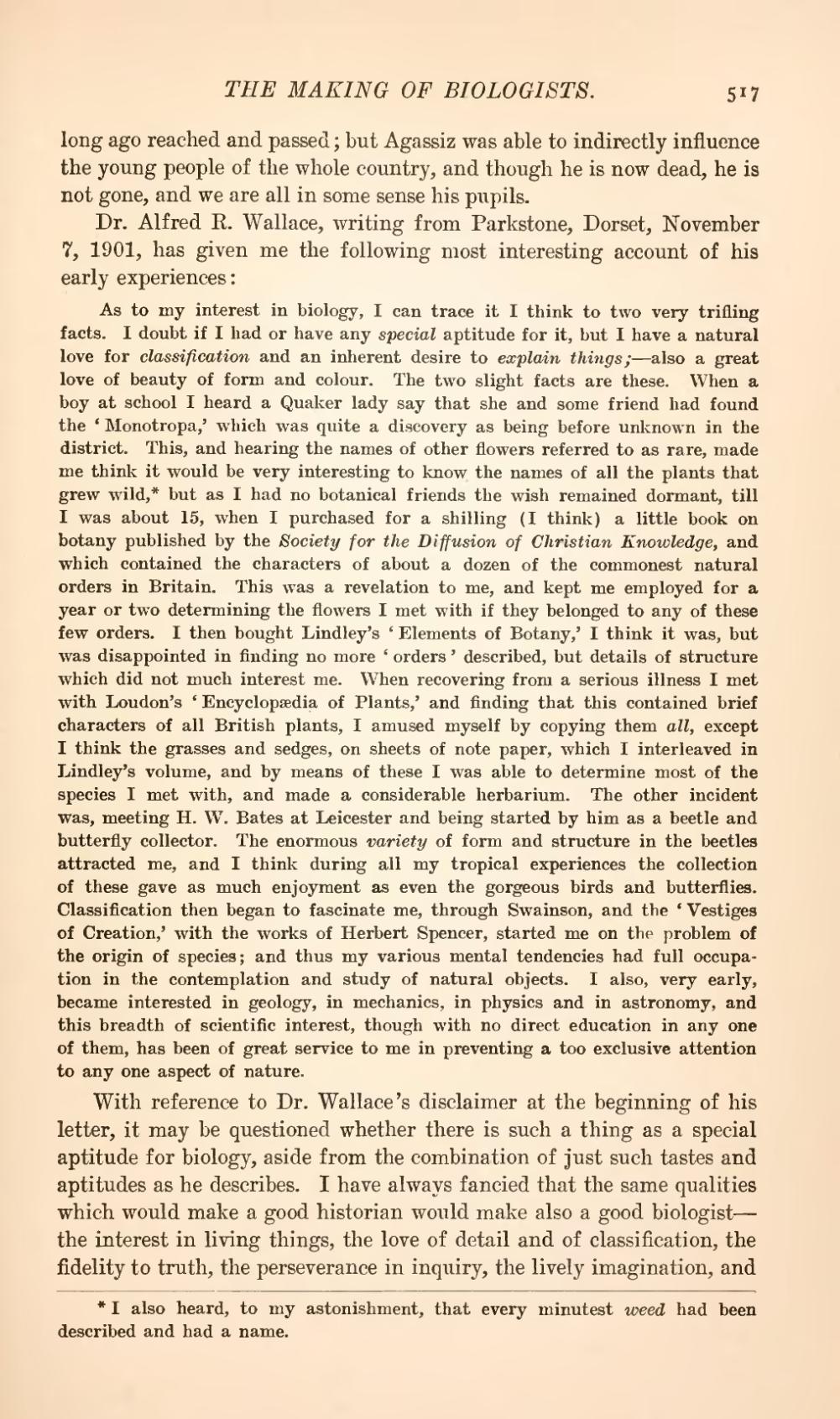THE MAKING OF BIOLOGISTS.
517
long ago reached and passed; but Agassiz was able to indirectly influence the young people of the whole country, and though he is now dead, he is not gone, and we are all in some sense his pupils.
Dr. Alfred E. Wallace, writing from Parkstone, Dorset, November 7, 1901, has given me the following most interesting account of his early experiences:
As to my interest in biology, I can trace it I think to two very trifling facts. I doubt if I had or have any special aptitude for it, but I have a natural love for
classification and an inherent desire to
explain things;—also a great love of beauty of form and colour. The two slight facts are these. When a boy at school I heard a Quaker lady say that she and some friend had found the 'Monotropa,' which was quite a discovery as being before unknown in the district. This, and hearing the names of other flowers referred to as rare, made me think it would be very interesting to know the names of all the plants that grew wild,
[1] but as I had no botanical friends the wish remained dormant, till I was about 15, when I purchased for a shilling (I think) a little book on botany published by the
Society for the Diffusion of Christian Knowledge, and which contained the characters of about a dozen of the commonest natural orders in Britain. This was a revelation to me, and kept me employed for a year or two determining the flowers I met with if they belonged to any of these few orders. I then bought Lindley's 'Elements of Botany,' I think it was, but was disappointed in finding no more 'orders' described, but details of structure which did not much interest me. When recovering from a serious illness I met with Loudon's 'Encyclopædia of Plants,' and finding that this contained brief characters of all British plants, I amused myself by copying them
all, except I think the grasses and sedges, on sheets of note paper, which I interleaved in Lindley's volume, and by means of these I was able to determine most of the species I met with, and made a considerable herbarium. The other incident was, meeting H. W. Bates at Leicester and being started by him as a beetle and butterfly collector. The enormous
variety of form and structure in the beetles attracted me, and I think during all my tropical experiences the collection of these gave as much enjoyment as even the gorgeous birds and butterflies. Classification then began to fascinate me, through Swainson, and the 'Vestiges of Creation,' with the works of Herbert Spencer, started me on the problem of the origin of species; and thus my various mental tendencies had full occupation in the contemplation and study of natural objects. I also, very early, became interested in geology, in mechanics, in physics and in astronomy, and this breadth of scientific interest, though with no direct education in any one of them, has been of great service to me in preventing a too exclusive attention to any one aspect of nature.
With reference to Dr. Wallace's disclaimer at the beginning of his letter, it may be questioned whether there is such a thing as a special aptitude for biology, aside from the combination of just such tastes and aptitudes as he describes. I have always fancied that the same qualities which would make a good historian would make also a good biologist—the interest in living things, the love of detail and of classification, the fidelity to truth, the perseverance in inquiry, the lively imagination, and
- ↑ I also heard, to my astonishment, that every minutest weed had been described and had a name.
